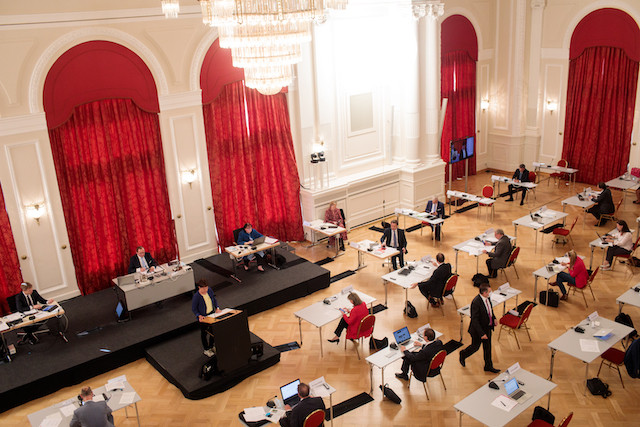The revelations saw an international group of journalists trawl through millions of documents on the owners of companies registered in Luxembourg, identifying criminals, oligarchs and celebrities who funnel money through the grand duchy. The data was sourced from the beneficial owners register, a database that went online in 2019.
“Our position today in the context of OpenLux is different than the one we unfortunately had back during LuxLeaks,” finance minister Pierre Gramegna told lawmakers, outlining how Luxembourg had done away with banking secrecy and was now fully compliant with EU and OECD rules on taxation and transparency.
“Our financial centre transformed itself. It’s transparent, it’s open and it’s attractive,” Gramegna said. “We are stronger today.”
The finance minister minister was backed by the coalition parties (DP, LSAP, déi Gréng) but also the opposition. Laurent Mosar (CSV) said the government had reacted well in responding to the claims made in the media, adding that he trusted the executive to follow-up on allegations of illegal activity unveiled by OpenLux.
Justice minister Sam Tanson had previously said her ministry would investigate how the register could be made more efficient in targeting suspicious activity. “We must do everything to identify the black sheep along the entire money laundering chain, that we must sanction those who tolerate those who exercise and enable these practices,” she said.
MPs agreed that the OpenLux investigation had only been possible in the first place because Luxembourg made its register publicly accessible, whereas in other countries a fee is required, or it cannot be consulted anonymously.
Mosar, Gilles Baum (DP), Georges Engel (LSAP) and Fernand Kartheiser (ADR) spoke of other countries being jealous of Luxembourg’s success as an international financial centre and even Josée Lorsché (déi Gréng) said: “The fact alone that a lot of foreign capital is managed and invested through Luxembourg, and that famous personalities pop up, isn’t per se problematic for us.”
The conversation has shifted to finding the “black sheep” and closing loopholes.
Only the two smallest groups in parliament--déi Lénk and the Pirate Party--clapped back against the finance minister’s assurances.
“I don’t care that it’s legal,” said David Wagner (déi Lénk) about the financial centre’s activities. “I can imagine that the financial centre isn’t primarily interested in attracting mafiosos or grand criminals,” he said. “What interests the financial centre are the white wolves we want to attract. The white wolves who benefit from the legal tax framework to not pay taxes.”
Wagner slammed Luxembourg’s role in allowing multinationals and billionaires to legally avoid taxes. “I won’t defend this model,” he said.
Sven Clement (Pirates), too, said the collateral damage was enormous both in the countries that are missing out on revenue because of tax optimisation but also for people in Luxembourg left behind because of the country’s economic model leading to rising housing prices and costs of living, and the exclusion of those less well off.
“Is everything that is legal ethically correct,” Clement asked. “With what kind of people does Luxembourg want to do business?”
